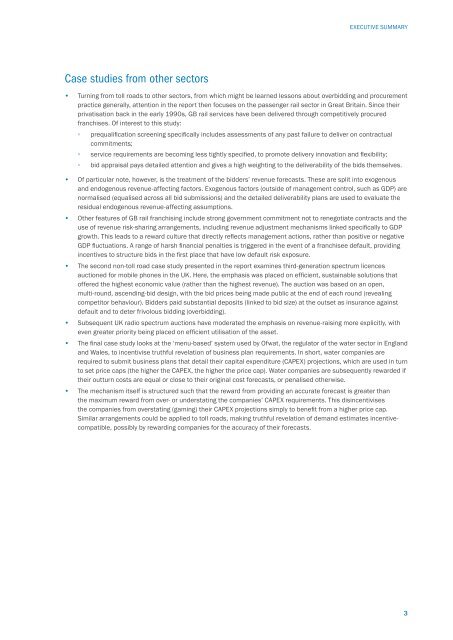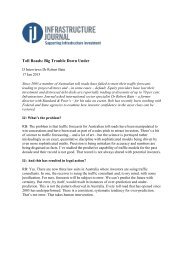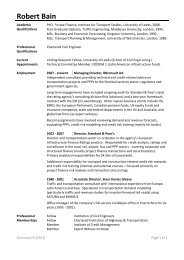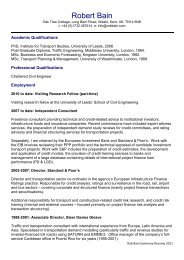Disincentivising overbidding for toll road concessions
Disincentivising overbidding for toll road concessions
Disincentivising overbidding for toll road concessions
- No tags were found...
You also want an ePaper? Increase the reach of your titles
YUMPU automatically turns print PDFs into web optimized ePapers that Google loves.
EXECUTIVE SUMMARY<br />
Case studies from other sectors<br />
••<br />
Turning from <strong>toll</strong> <strong>road</strong>s to other sectors, from which might be learned lessons about <strong>overbidding</strong> and procurement<br />
practice generally, attention in the report then focuses on the passenger rail sector in Great Britain. Since their<br />
privatisation back in the early 1990s, GB rail services have been delivered through competitively procured<br />
franchises. Of interest to this study:<br />
◦◦<br />
prequalification screening specifically includes assessments of any past failure to deliver on contractual<br />
commitments;<br />
◦◦<br />
service requirements are becoming less tightly specified, to promote delivery innovation and flexibility;<br />
◦◦<br />
bid appraisal pays detailed attention and gives a high weighting to the deliverability of the bids themselves.<br />
••<br />
Of particular note, however, is the treatment of the bidders’ revenue <strong>for</strong>ecasts. These are split into exogenous<br />
and endogenous revenue-affecting factors. Exogenous factors (outside of management control, such as GDP) are<br />
normalised (equalised across all bid submissions) and the detailed deliverability plans are used to evaluate the<br />
residual endogenous revenue-affecting assumptions.<br />
••<br />
Other features of GB rail franchising include strong government commitment not to renegotiate contracts and the<br />
use of revenue risk-sharing arrangements, including revenue adjustment mechanisms linked specifically to GDP<br />
growth. This leads to a reward culture that directly reflects management actions, rather than positive or negative<br />
GDP fluctuations. A range of harsh financial penalties is triggered in the event of a franchisee default, providing<br />
incentives to structure bids in the first place that have low default risk exposure.<br />
••<br />
The second non-<strong>toll</strong> <strong>road</strong> case study presented in the report examines third-generation spectrum licences<br />
auctioned <strong>for</strong> mobile phones in the UK. Here, the emphasis was placed on efficient, sustainable solutions that<br />
offered the highest economic value (rather than the highest revenue). The auction was based on an open,<br />
multi-round, ascending-bid design, with the bid prices being made public at the end of each round (revealing<br />
competitor behaviour). Bidders paid substantial deposits (linked to bid size) at the outset as insurance against<br />
default and to deter frivolous bidding (<strong>overbidding</strong>).<br />
••<br />
Subsequent UK radio spectrum auctions have moderated the emphasis on revenue-raising more explicitly, with<br />
even greater priority being placed on efficient utilisation of the asset.<br />
••<br />
The final case study looks at the ‘menu-based’ system used by Ofwat, the regulator of the water sector in England<br />
and Wales, to incentivise truthful revelation of business plan requirements. In short, water companies are<br />
required to submit business plans that detail their capital expenditure (CAPEX) projections, which are used in turn<br />
to set price caps (the higher the CAPEX, the higher the price cap). Water companies are subsequently rewarded if<br />
their outturn costs are equal or close to their original cost <strong>for</strong>ecasts, or penalised otherwise.<br />
• • The mechanism itself is structured such that the reward from providing an accurate <strong>for</strong>ecast is greater than<br />
the maximum reward from over- or understating the companies’ CAPEX requirements. This disincentivises<br />
the companies from overstating (gaming) their CAPEX projections simply to benefit from a higher price cap.<br />
Similar arrangements could be applied to <strong>toll</strong> <strong>road</strong>s, making truthful revelation of demand estimates incentivecompatible,<br />
possibly by rewarding companies <strong>for</strong> the accuracy of their <strong>for</strong>ecasts.<br />
3






